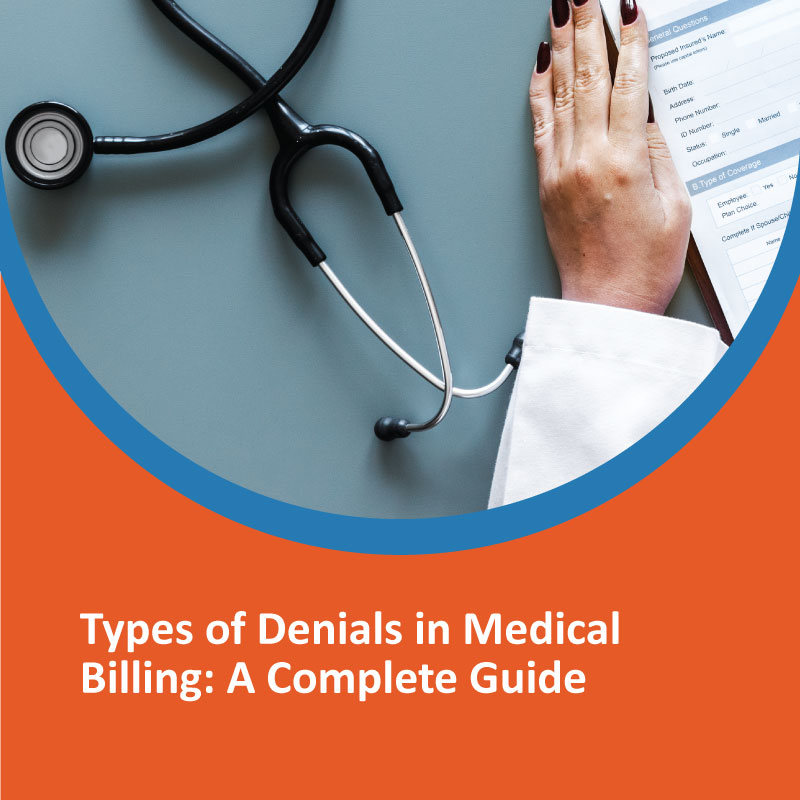Medical billing plays a critical role in the healthcare system. It ensures that healthcare providers get paid for the services they offer. However, not every claim submitted to insurance companies gets approved. Denials are common and can disrupt providers’ cash flow. Understanding the different types of denials in medical billing is essential for reducing errors and improving reimbursement rates. In this article, we will break down the various types of denials and how they affect the billing process.
What Are Denials?
Denials occur when an insurance company refuses to pay a claim submitted by a healthcare provider. This can happen for various reasons, such as errors in the claim, missing information, or failure to meet specific requirements. Denials can either result in permanent non-payment or require additional steps to fix the issue.
Denials are categorized based on their nature. Let’s explore the most common types of denials in medical billing.
1. Hard Denials
Hard denials are claims that cannot be reversed or corrected. Once denied, these claims result in permanent non-payment. Common reasons for hard denials include:
- Late submission of claims
- Services not covered by the patient’s insurance
- Missing authorization for the service
Since these denials cannot be recovered, they lead to a direct loss of revenue.
2. Soft Denials
Soft denials are temporary and can be corrected. These claims are rejected due to minor issues that can be resolved. Examples of soft denials include:
- Missing information (e.g., patient details or diagnosis codes)
- Incorrect billing codes
Once the errors are fixed, the claim can be resubmitted. Providers should act quickly to resolve soft denials to avoid payment delays.
3. Clinical Denials
Clinical denials occur when the insurance company believes the treatment was not necessary. This often happens when:
- The service is not deemed medically necessary
- The length of hospital stay is considered too long
- The level of care provided is not justified
These denials require strong supporting documentation to prove the necessity of the treatment.
4. Technical Denials
Technical denials happen due to administrative or process-related errors. These include:
- Inaccurate patient information
- Incorrect insurance details
- Failure to obtain prior authorization
Technical denials are common and can usually be resolved by correcting the mistakes and resubmitting the claim.
5. Authorization Denials
Some treatments or procedures require prior authorization from the insurance company. The claim will be denied if the authorization is not obtained or properly documented. Examples include:
- Surgeries
- Expensive diagnostic tests like MRIs
Always verify the authorization requirements before providing services to avoid these denials.
6. Eligibility Denials
Eligibility denials happen when a patient’s insurance is inactive or does not cover the service provided. Reasons for this include:
- The insurance policy has expired
- The patient is not eligible for coverage at the time of service
Always verify the patient’s insurance details before the appointment to prevent eligibility denials.
7. Coding Denials
Accurate coding is essential in medical billing. Coding denials occur when:
- Incorrect CPT, ICD, or HCPCS codes are used
- Codes do not match the patient’s diagnosis
To avoid coding errors, ensure trained coders handle the claims process and double-check the codes before submission.
8. Duplicate Claim Denials
Duplicate claim denials occur when the same claim is submitted multiple times without proper justification. This can happen accidentally or due to system errors. Insurance companies reject these claims to avoid overpayments. Keep accurate records and follow an appropriate submission process to prevent duplicate claim denials.
9. Coordination of Benefits (COB) Denials
Coordination of Benefits (COB) applies when a patient has multiple insurance policies. Denials occur when:
- The primary and secondary insurance payers are not coordinated properly
- Incorrect payer is billed first
Always identify the primary payer to ensure the claim is submitted to the correct insurance.
10. Timely Filing Denials
Every insurance company has a specific time limit for submitting claims. Claims filed after the deadline are denied. These are called timely filing denials. To avoid this, ensure claims are submitted after the service is provided as soon as possible.
How to Prevent Denials
Preventing denials requires careful attention to detail and efficient processes. Here are some tips:
- Verify patient information: Ensure accurate details are collected during registration.
- Check insurance eligibility: Confirm the patient’s coverage before providing services.
- Obtain prior authorizations: Always check if the procedure requires pre-approval.
- Train staff: Provide regular training to billing and coding teams.
- Use technology: Invest in medical billing software to reduce errors.
- Monitor deadlines: Track submission timelines to avoid late claims.
Conclusion
Denials are a significant challenge in medical billing. They delay payments and can lead to financial losses. Understanding the different types of denials is the first step toward reducing them. By identifying the common reasons for denials and implementing preventive measures, healthcare providers can improve their revenue cycle and ensure smooth operations. Careful attention and proper planning can prevent or resolve most denials quickly.

